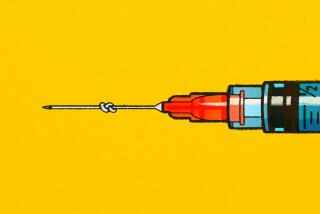Nips, tucks and herbs
- Share via
To true devotees of the pursuit of beauty, the recipe for retaining youth and gorgeousness appears to involve tinkering with what’s inside as well as what’s outside. A newly published survey has found that 55% of cosmetic surgery patients take herbal supplements, compared with only 24% of similar people not undergoing surgery.
UCLA researchers said they worried that these supplements, in rare cases, might add to the complications of surgery. Published in this month’s issue of the journal Plastic and Reconstructive Surgery, the report also found surgeons performing such surgeries are frequently unaware of the supplements’ effects, or even that their patients are taking them.
The study compared 100 adults (95 women and five men) older than 40 who went to UCLA for cosmetic plastic surgery treatments with 100 adults of a similar gender distribution who were not getting cosmetic surgery. Subjects were asked about 13 herbs and supplements that are either top sellers or have the greatest potential to cause complications after surgery.
The researchers found that the most commonly used herbs and supplements were ephedra (18%), chondroitin (18%), echinacea (14%) and glucosamine (10%). All 55 of the surgery patients taking herbs used at least two supplements, and at least one every day.
“In one sense it seems ironic that something like taking a natural substance is being used by people getting plastic surgery,” said Dr. James Bradley, associate professor of surgery at UCLA, and one of the study’s authors. “But when you look at it carefully, that population is looking for self-improvement. They are using both herbs and plastic surgery to rejuvenate themselves.”
Cosmetic surgery patients were also more likely to do yoga, get acupuncture, practice meditation and see chiropractors, according to the study.
Bradley said he and his colleagues undertook the survey because they found that many of their plastic surgery patients took herbs and supplements but neglected to inform their surgeons before having face-lifts, breast augmentations and abdominoplasties.
The study also surveyed 50 surgeons and found they were only familiar with the side effects of one herb, ephedra. (Ephedra has been taken off the market since the survey was completed because it can cause high blood pressure and strokes.)
One-third of the surgeons knew that the supplement chondroitin has been associated with excess bleeding. But they did not know about potential side effects of most of the other herbs or supplements, Bradley said. (For the most part, doctors do not study herbs in medical school.)
Bradley said he had only anecdotal evidence of any dangerous side effects from herbal ingestion during or after plastic surgery. For example one plastic surgeon cited in the study said he had a patient who bled heavily after her face-lift and found the only medication she had taken was garlic.
Dr. Mary Hardy, co-director of the integrative medicine program at the Venice Family Clinic and an expert on the medical effects of botanicals and supplements, said the study contained some inaccurate information about herbs, including, for example, incorrect names of species and erroneous information about the supplements’ medical effects.
However, she said, the research did highlight an important issue: Patients and surgeons need to address herb consumption before surgery.
Any unnecessary product, whether an herb or an over-the-counter medication, should be stopped before surgery, she said.
“I would stop most things 10 days before surgery,” she said. “I would be particularly careful of herbs and supplements that might effect platelet function, such as gingko, garlic, perhaps ginseng, fish oil and vitamin E.”
The American Society of Anesthesiologists recommends discontinuing use of herbs and supplements two to three weeks before surgery.






